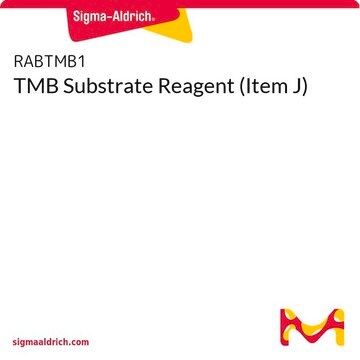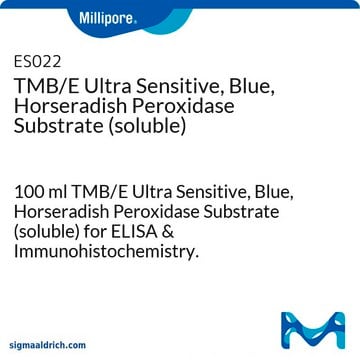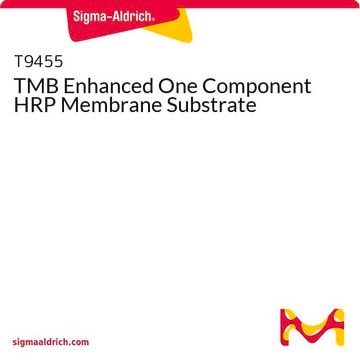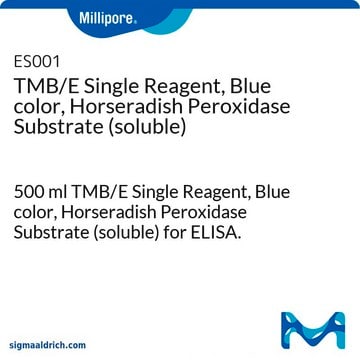T0440
3,3′,5,5′-Tetramethylbenzidine
peroxidase substrate, chromogenic, liquid
Synonim(y):
TMB
Zaloguj sięWyświetlanie cen organizacyjnych i kontraktowych
About This Item
Kod UNSPSC:
12352204
NACRES:
NA.83
Polecane produkty
product name
3,3′,5,5′-Tetramethylbenzidine (TMB) Liquid Substrate System for ELISA, peroxidase substrate
Poziom jakości
Postać
liquid
temp. przechowywania
2-8°C
Powiązane kategorie
Opis ogólny
TMB substrate is a chromogenic substrate for horseradish peroxidase - HRP.
Zastosowanie
TMB substrate is used in ELISA procedures, which utilize horseradish peroxidase conjugates. TMB substrate develops a soluble blue reaction product that can be read at 370 or 655 nm at 370 or 655 nm. The reaction is stopped with acid, forming a yellow reaction product which enables accurate intensity measurement at 450 nm.
How to use our TMB substrate:
How to use our TMB substrate:
- Our TMB substrate is supplied as a ready-to-use peroxidase substrate containing TMB in a mildly acidic buffer. Prior to reaction with peroxidase, the substrate should be a colorless to light bluish-green solution. The substrate system develops a blue reaction product when reacted with peroxidase.
- Upon reaching your assay endpoint with addition of acid, measure the TMB substrate intensity at 450 nm.
- Our TMB Substrate is recommended for ELISA (microwell) procedures, and has been used in various assays, as a substrate for horseradish peroxidase antibody conjugate for detecting hendra virus glycoprotein, tetracosactide, sIgA and neutrophil extracellular traps (NETs).
- 3,3′,5,5′-Tetramethylbenzidine (TMB) Liquid Substrate System is not recommended for membrane applications. Since TMB substrate produces a soluble reaction product, it is not recommended for histochemistry or blotting.
polecane
Numer produktu
Opis
Cennik
Kod klasy składowania
10 - Combustible liquids
Klasa zagrożenia wodnego (WGK)
WGK 3
Temperatura zapłonu (°F)
Not applicable
Temperatura zapłonu (°C)
Not applicable
Certyfikaty analizy (CoA)
Poszukaj Certyfikaty analizy (CoA), wpisując numer partii/serii produktów. Numery serii i partii można znaleźć na etykiecie produktu po słowach „seria” lub „partia”.
Masz już ten produkt?
Dokumenty związane z niedawno zakupionymi produktami zostały zamieszczone w Bibliotece dokumentów.
Klienci oglądali również te produkty
Myeloid-specific deletion of peptidylarginine deiminase 4 (PAD4) mitigates atherosclerosis.
Liu Y, et al.
Frontiers in immunology, 9(4), 1680-1680 (2018)
Denise Traxler et al.
Clinica chimica acta; international journal of clinical chemistry, 473, 127-132 (2017-08-29)
Heat shock proteins (HSPs) represent intracellular mechanisms of stress response. Clinical implications of their (systemic) expression in patients with chronic heart failure (HF) remain inconclusive. In outpatients with chronic stable HF plasma HSP27 levels were measured using ELISA. Patients were
Spontaneous and tetracosactide-induced anti-ACTH antibodies in man
Gan EH, et al.
Clinical Endocrinology, 84(4), 489-495 (2016)
Young Children Display Diurnal Patterns of Salivary IgA and Alpha-Amylase Expression Which Are Independent of Food Intake and Demographic Factors
Lim PW, et al.
BioMed Research International, 2019 (2019)
Marco Maccarini et al.
Langmuir : the ACS journal of surfaces and colloids, 33(38), 9988-9996 (2017-08-29)
OprF has a central role in Pseudomonas aeruginosa virulence and thus provides a putative target for either vaccines or antibiotic cofactors that could overcome the bacterium's natural resistance to antibiotics. Here we describe a procedure to optimize the production of
Nasz zespół naukowców ma doświadczenie we wszystkich obszarach badań, w tym w naukach przyrodniczych, materiałoznawstwie, syntezie chemicznej, chromatografii, analityce i wielu innych dziedzinach.
Skontaktuj się z zespołem ds. pomocy technicznej










